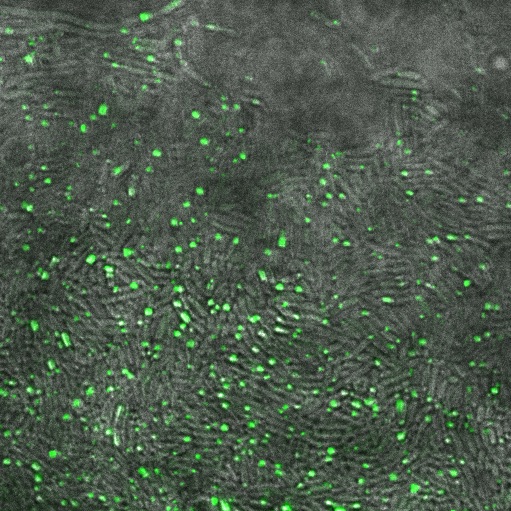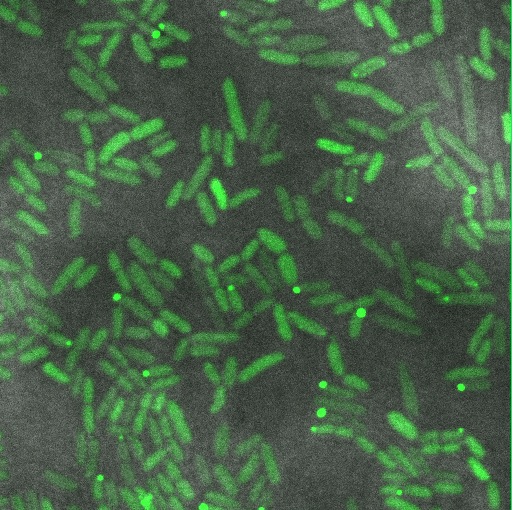Difference between revisions of "Part:BBa K638202"
| Line 5: | Line 5: | ||
Bacteria expressing this construct will produce Reflectin A1 with a poly-histidine tag at the N-terminus in order to enable purification with a his-affinity column used in conjunction with nickel or cobalt resins. | Bacteria expressing this construct will produce Reflectin A1 with a poly-histidine tag at the N-terminus in order to enable purification with a his-affinity column used in conjunction with nickel or cobalt resins. | ||
| − | |||
===Usage and Biology=== | ===Usage and Biology=== | ||
| + | This device was characterised as [[Part:BBa_K638301]], where reflectin is fused to GFP as an easy reporter for microscopy. We assessed folding on multiple backbones. | ||
| + | |||
| + | <gallery widths=400px heights=500px> | ||
| + | Image:Cam_Reflectin-GFP-inclusionbodies.jpg | Reflectin-GFP on [[Part:pSB1A3 | pSB1A3]](a high copy plasmid), induced with 1mM Arabinose. Fluorescence is localised in dots at the end of the cells, indicating that fusion protein is localised to insoluble inclusion bodies. | ||
| + | Image:Cam-Low-copy-reflectin.jpg | Reflectin-GFP on [[Part:pSB3k3 | pSB3K3]] (low/med copy plasmid), induced with 1mM Arabinose. The fusion protein is distributed throughout the cytoplasm, indicating soluble protein is expressed. | ||
| + | </gallery> | ||
| + | |||
| + | From this confocal imaging, we recommend that reflectin be expressed on a '''low/med copy number backbone''' to allow protein folding to occur to give soluble protein. High copy number plasmids give inclusion bodies. Some inclusion bodies are also visible in the low copy construct, suggesting that some cells are expressing more fusion protein than others. See our [[Part:BBa_I0500:Experience | experience]] of the pBAD promoter for a discussion of variations of induction within a population of cells. | ||
| + | |||
| + | |||
<!-- --> | <!-- --> | ||
Revision as of 23:04, 21 September 2011
Arabinose inducible Poly-His Reflectin A1 generator
Arabinose inducible Poly-His Reflectin A1 generator produces a poly-histidine (his-tagged) form of Reflectin A1( BBa_K638001). Bacteria expressing this construct will produce Reflectin A1 with a poly-histidine tag at the N-terminus in order to enable purification with a his-affinity column used in conjunction with nickel or cobalt resins.
Usage and Biology
This device was characterised as Part:BBa_K638301, where reflectin is fused to GFP as an easy reporter for microscopy. We assessed folding on multiple backbones.
Reflectin-GFP on pSB1A3(a high copy plasmid), induced with 1mM Arabinose. Fluorescence is localised in dots at the end of the cells, indicating that fusion protein is localised to insoluble inclusion bodies.
Reflectin-GFP on pSB3K3 (low/med copy plasmid), induced with 1mM Arabinose. The fusion protein is distributed throughout the cytoplasm, indicating soluble protein is expressed.
From this confocal imaging, we recommend that reflectin be expressed on a low/med copy number backbone to allow protein folding to occur to give soluble protein. High copy number plasmids give inclusion bodies. Some inclusion bodies are also visible in the low copy construct, suggesting that some cells are expressing more fusion protein than others. See our experience of the pBAD promoter for a discussion of variations of induction within a population of cells.
Sequence and Features
- 10COMPATIBLE WITH RFC[10]
- 12INCOMPATIBLE WITH RFC[12]Illegal NheI site found at 1205
- 21INCOMPATIBLE WITH RFC[21]Illegal BamHI site found at 1144
Illegal BamHI site found at 1261 - 23COMPATIBLE WITH RFC[23]
- 25INCOMPATIBLE WITH RFC[25]Illegal AgeI site found at 979
- 1000INCOMPATIBLE WITH RFC[1000]Illegal SapI site found at 961


